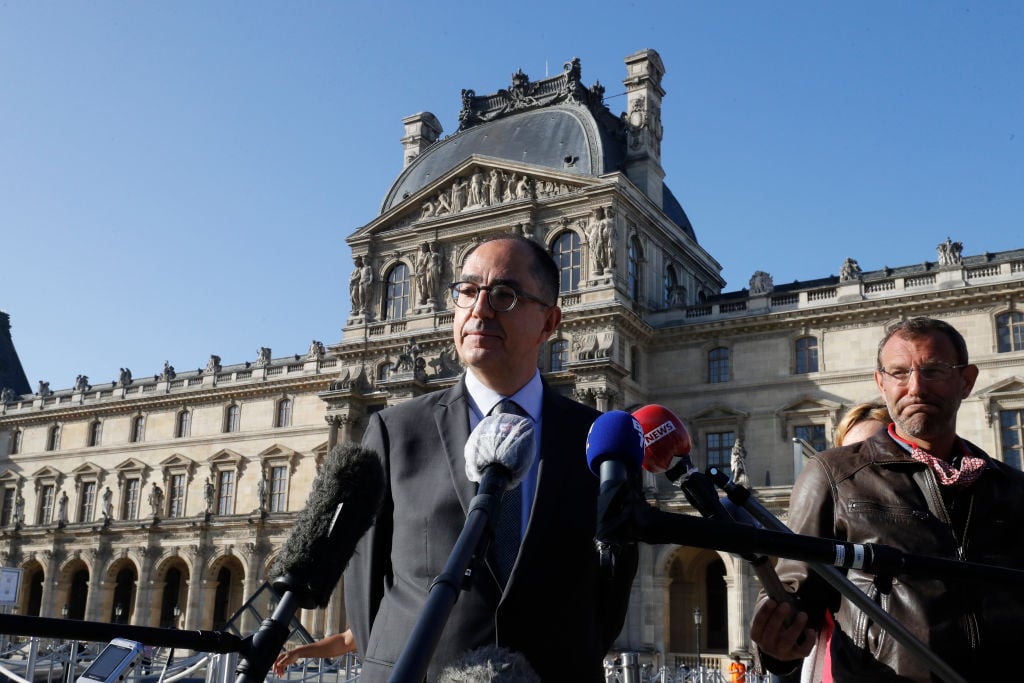
French judges maintained charges today against the former Louvre director Jean-Luc Martinez and his former colleague, the curator and archaeologist Jean-Francois Charnier, for their alleged links to an antiquities trafficking ring. The official charges are for “complicity” and “facilitating” acquisitions of allegedly trafficked antiquities that were sold to the Louvre Abu Dhabi between 2014 and 2017, for over €50 million. Both are appealing the decision to France’s supreme court.
The ruling came despite the public prosecutor’s request in November 2022 to drop charges against both defendants following appeals and a re-examination of their suspected involvement with a network of smugglers currently under international investigation for looting antiquities in the Near and Middle East. The prosecutor’s decision was seen as a rare indication an error may have been committed in implicating the museum workers, who spent much of their careers raising awareness around the dangers of plundering archaeological sites. Indeed, their indictment sent shock waves throughout the art world and beyond, tarnishing France’s image as a leading cultural expert in the field, a savoir-faire the French state traditionally wields to garner diplomatic influence abroad.
“We’re all very surprised,” Charnier’s lawyer, Corinne Hershkovitch, told Artnet News over the telephone. “I deeply regret that the examining chamber did not follow the public prosecutor’s logical request [to drop charges], based on a total absence of any sufficient, serious corroborating evidence of Jean-Francois Charnier’s guilt,” she said.
Martinez, who led the Louvre from 2013 to 2021, appealed his indictment because of a technical error when charged in May 2022 for complicity in gang fraud and money laundering. He is accused of negligence while heading the Louvre, and simultaneously acting as president of the Agence France-Muséums’ (AFM) scientific committee, which was responsible for certifying antiquities suggested for acquisition by the Louvre Abu Dhabi, as it built its collection prior to opening in 2017.
Several of the items recommended and approved by the AFM consulting agency are now believed to have been purchased with fake documents, following an investigation by the French office against art trafficking (OCBC) in cooperation with the Manhattan District Attorney’s office.
Charnier, who also worked at the AFM as its scientific director, led a team tasked with researching provenance of objects for acquisition by the Louvre Abu Dhabi. To do so, they relied on and worked in tandem with leading connoisseurs within France’s network of museums, including the Louvre’s antiquities department. The Louvre and Louvre Abu Dhabi have launched civil actions in the case.
Charnier’s lawyer argued that contrary to the initial, incriminating interpretation of messages between Charnier and staff, which appear to suggest he dismissed doubts about provenance, her client pursued those and other concerns, until he was given adequate assurance that an object was of legal origin.
Agence France Muséums “did more than other museums at the time, to ensure that due diligence was followed,” said Hershkovitch. She said that during the period in question, provenance research was not done as rigorously as it is today. Indeed, other museums, such as the Metropolitan Museum, made headlines when they recently returned to Egypt and Italy looted antiquities, however, in those cases no criminal charges have been brought against museum workers. Following the indictment last year, Charnier was fired from his job as the museum development advisor for the Al-Ula cultural project in Saudi Arabia.
Other defendants in the case include German-Lebanese art dealer Roben Dib, who, along with Paris-based dealer Christophe Kunicki, is accused of falsifying documents to traffic hundreds of artifacts, including those sold to the Louvre Abu Dhabi via AFM. Both have denied wrongdoing. Dib was the collaborator and alleged front man for the Simonian family of dealers and art collectors, who run the Dionysos gallery of ancient Coins and Antiquities in Hamburg. No charges have been brought against them to date in Germany, where officials are still investigating the case. This despite French-issued arrest warrants for Serop Simonian and his two children for criminal conspiracy, gang fraud, and money laundering.
Martinez’s lawyer, Francois Artuphel, told Le Monde that today’s decision to maintain charges, “is unfounded… and we have no doubt that the next step in the procedure will re-establish this injustice.”